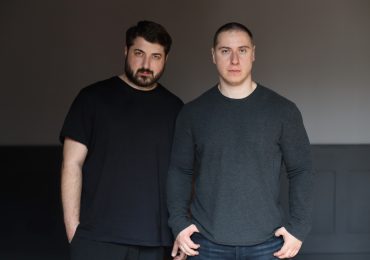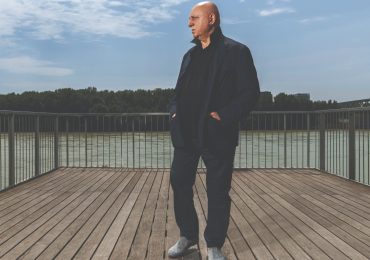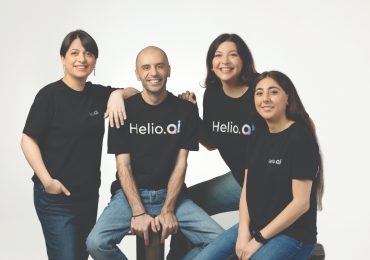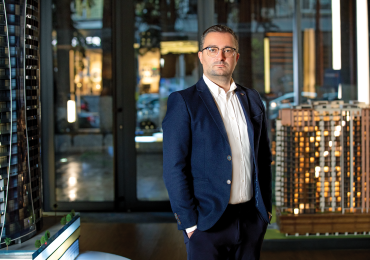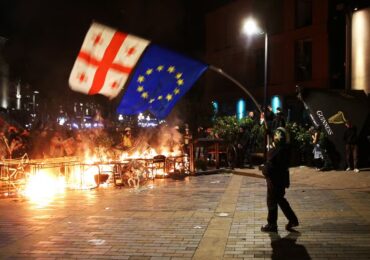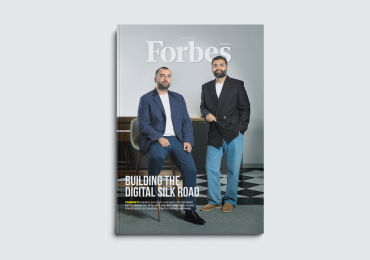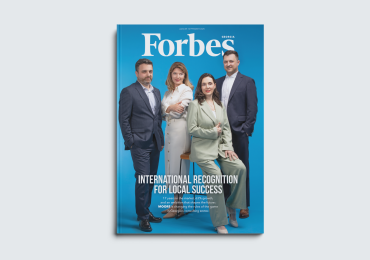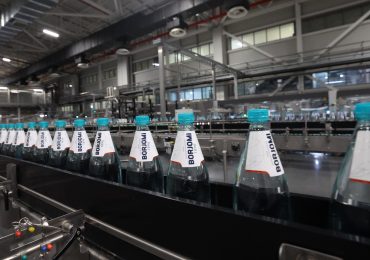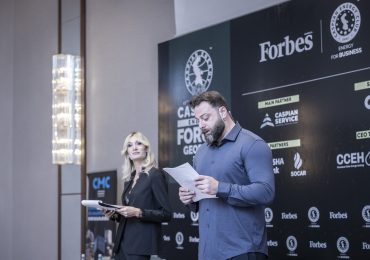For creative industry veterans Sandro Tsitskishvili and Giorgi Tabatadze, founding the new advertising agency Supermarket isn’t just another career move — it’s a response to a system in need of fresh thinking. Together with co-founders Eka Kipiani and Vaska Chubinidze, they’ve built an agency model that takes into account the needs of every single link in the creative chain.
I meet Sandro and Giorgi at Supermarket’s headquarters within D-block — a vibrant co-working space in the heart of the city. The physical boundaries between companies here are more symbolic than real, making it difficult to distinguish exactly where Supermarket begins and ends. But Sandro and Giorgi are mentally immersed in the space they’ve created: constantly viewing it through a user’s perspective, rethinking the layout, discussing product packaging, and forming teams to oversee the functionality of the environment.
“Starting an agency has always been something of a leitmotif in all of our lives,” Sandro explains, gesturing around the open space. “The four of us have worked at agencies that had both strengths and shortcomings. Every time we encountered a frustrating issue, we’d imagine how it could be fixed. What eventually pushed us to create Supermarket was that we had, in our minds, formed a completely new model — one that reimagines how a creative agency operates, how it’s structured, and even what it stands for.”
The co-founders — Sandro Tsitskishvili, Giorgi Tabatadze, Vaska Chubinidze, and Eka Kipiani — have invested countless hours (and really, years) thinking this through. Each knows the anatomy of the creative field inside and out, having moved through roles as freelancers, consultants, agency employees, and team leaders. Beyond their long history of collaboration and friendship, they now share a common mission: to build an agency for a new era — one where both clients and creative professionals can find exactly what they need.
Over the past few years, the creative industry has undergone massive shifts — in Georgia and globally. The fast-changing landscape has made traditional hierarchical models feel clunky and obsolete. Yet there’s no ready-made formula for how to adapt and stay relevant. Each player has to find their own answer to that question.
“In recent years, many experienced and talented professionals have left traditional agencies and become freelancers,” Giorgi Tabatadze tells me, leaning forward in his chair. Freelancing gave creatives control over their time and improved their finances, he explains — but not without significant trade-offs. “The biggest drawback is loneliness. Creativity doesn’t thrive in isolation. We’re used to exchanging ideas, knowledge, and experiences — that’s where inspiration comes from.”
“What we used to sell were ideas, creativity, and the vague hope they’d become popular. Now, we’ve shifted perspective — we sell commercially successful approaches.”
— Sandro Tsitskishvili
As freelancers, creatives also found themselves burdened with all the tedious but necessary logistics. “Yes, you’re your own boss and you earn as much as you want — but sometimes the biggest projects in the country never reach you, because clients still prefer working with agencies,” Sandro says, speaking from personal experience.
Supermarket offers an elegant solution: its innovative model allows creative professionals to maintain their financial independence while regaining a sense of collaboration, administrative support, and access to high-profile clients. In a world that previously offered only two options — agency life or freelancing — Supermarket proposes a third: a flexible environment where creatives can choose their own balance between autonomy and teamwork.
As the founders describe it, Supermarket isn’t a traditional workforce — it’s more like a creative commune, where each member can work on large, ambitious projects without sacrificing the perks of freelancing.
Sandro adds that the current state of Georgia’s creative industry isn’t ideal for companies either. “The loss of senior talent from agencies led to a much younger workforce. That’s not inherently bad — but clients often end up working with teams that don’t fully understand their business challenges.”
The exodus of talent from traditional agencies created what Sandro and his partners recognized as a massive untapped opportunity. “Most agencies today feel a little ‘dinosaur-ish’ — and I’m not just talking about Georgia. Even global networks are operating on outdated models. Advertising and marketing have changed radically — and dramatically,” he emphasizes.

All four founders have firsthand experience with both the benefits and limitations of working independently and within agencies. Asked how this particular founding team came together, Giorgi says you could divide them into two complementary pairs: he and Vaska focus on business consulting and strategy, while Sandro and Eka “are, if not the very best, then definitely among the top creative minds in the country.”
Sandro emphasizes that Supermarket’s unique proposition lies in its synthesis of creative thinking and business insight. “On one hand, we have people who can deeply understand a company’s needs and specifics. On the other, we find joy in solving those problems creatively,” he explains with evident enthusiasm.
The name “Supermarket” emerged during a brainstorming session — it was Eka Kipiani’s idea. The founders were searching for a broad, category-defining name, and “Supermarket” perfectly captures their vision: a place where the shelves don’t just offer a few set products (big campaign, mid-sized campaign, a poster, or just a video), but instead, a whole range of tailored solutions for both common and niche business challenges. The name also carries a nostalgic ring for anyone who remembers the arrival of the first supermarkets in Georgia. “Do you remember how you felt the first time you walked into one?” Sandro asks with a smile.
Beyond reigniting the creative drive of experienced professionals, Supermarket also responds to persistent client dissatisfaction with traditional agencies. “What we used to sell were ideas, creativity, and the vague hope they’d become popular,” Sandro reflects. “We’ve shifted that perspective — now we offer commercially successful strategies.”
To ensure their agency model embeds innovation at every level, the founders made several key structural decisions.
The first was to build dedicated teams around each client. Groups of professionals from different fields will stay attached to the same brand long-term, overseeing its growth and development. This gives clients continuity — they won’t need to explain their brand’s values over and over to new faces. And for the creatives, it’s a chance to dive deeper into the internal and external factors affecting the business.
“Picture a typical day at a traditional agency,” says Sandro. “You walk in the door in the morning, and by evening you might have to think through tasks for six completely different brands. That constant mental switching makes it hard to focus on solving real business problems.” Compared to that, being able to focus on just one or two clients starts to feel like a real luxury.
Another major shift at Supermarket is the redefinition of the account manager role. In a classic agency setup, account managers are typically the people who receive briefs from the client and then oversee the execution of the project. At Supermarket, this responsibility is handed over to the project manager. The account manager’s new role is centered around building long-term relationships with the client and ensuring the strategy is delivered. That might mean spending a few days each week working directly from the client’s office — analyzing data, gathering insights, and feeding them back to the creative team working on the brief. The goal here is to keep creative work aligned with business objectives—especially in a market where conditions change at lightning speed.
“Our job isn’t just to think about brand parameters,” says Sandro. “Why does a client come to an agency in the first place? They have a business—and they want that business to grow. So it’s crazy for an agency not to offer exactly that kind of service.”
Of course, a legitimate question arises when your teams are composed of freelancers working on a per-project basis: how can clients trust that the quality will remain consistently high?
Supermarket tackles this issue with a system called the Board, a council structure that replaces traditional hierarchy with a horizontal quality control process. Before any idea ever reaches a client, it’s presented to this internal board, made up of creative directors from different project teams. Even if a particular director isn’t directly involved in the project, they’re still responsible for ensuring that the work meets both the client’s expectations and Supermarket’s own standards. In practice, it functions like a kind of “super team” of experienced professionals who have a hand directly or indirectly in every piece of work.
Beyond quality control, the freelance model also raises concerns around confidentiality and conflicts of interest—issues that traditional agencies usually address through corporate structures and strict internal rules. Giorgi Tabatadze explains that they’ve put clear safeguards in place: “If you’re working on Supermarket projects and have access to a client’s data, that means you can’t work with that client’s direct competitors. That’s the case in almost all situations.” The only exceptions might be highly technical tasks, where the contributors don’t have access to sensitive information. The founders are confident that, with a consistent and transparent approach to managing conflicts of interest, Supermarket can offer clients the same level of confidentiality they’d expect from any established agency.
Despite being only a few months old, Supermarket already has a successful campaign under its belt — a Women’s Day campaign for Zoommer. It was the agency’s first large-scale project, and as Giorgi Tabatadze explains, it came with more than its share of challenges.
“The context wasn’t just about Women’s Day,” he explains. “It was about reopening the entire advertising field after a three-month standstill. Once again, we were reminded just how difficult it is to create good communication in today’s world—especially brand communication. There are so many layers of context to consider at once, and navigating that labyrinth to find the right message is harder than ever. So when someone manages to do that well, it really matters.”
The campaign’s success suggests that Supermarket’s core belief is sound: flexible teams can respond to fast-changing, multi-dimensional market needs better than rigid, traditional structures. And according to Sandro, this is just the beginning. “The real advantages of this model will show over time — when each partnership proves its value in the long run.”
For the founders, the priority now is making sure the whole operation runs smoothly, building the kind of “machine” that allows the model to work at full capacity. “For me, success will be seeing everything run seamlessly by the end of our first year—without the founders needing to be involved in every little thing,” says Giorgi.
In addition to strengthening its core structure, Supermarket’s team is already exploring ways to expand — opening up new directions that will further differentiate them from traditional agencies. “This business has real growth potential,” Sandro notes. “For example, we could move into areas like e-commerce. We want to reach a stage where we can launch additional verticals as needed.”
Ultimately, the founders hope that their model won’t just push Supermarket forward, but will breathe new life into Georgia’s broader creative industry — one that hasn’t fully recovered from the pandemic’s impact.
“We all remember the boom years in Georgia’s creative scene, when local agencies were winning big at Cannes and making incredible work,” says Sandro. “But recently, things have gotten a bit monotonous. A fresh burst of energy is definitely needed.”
By attracting top talent and introducing clear performance indicators, Supermarket is aiming to reignite both ambition and healthy competition within the industry.
But perhaps the most important thing Supermarket is doing isn’t just launching memorable campaigns or giving seasoned creatives more freedom. What truly matters is the precedent they’re setting: that creativity can and should be a tool for real success—for both the client and the people solving the creative challenges.
At a time when both clients and creatives have grown used to staring at empty shelves, this new agency is throwing open its doors—and beyond the threshold lies a dizzying abundance of ideas and talent. Just like in a real supermarket.



